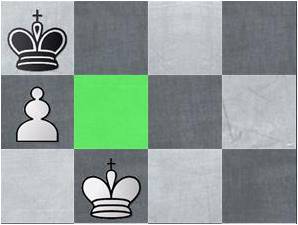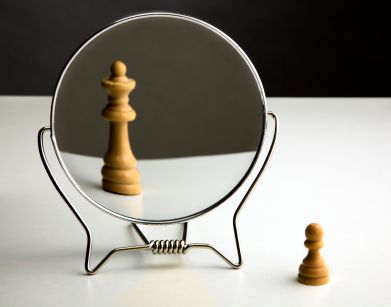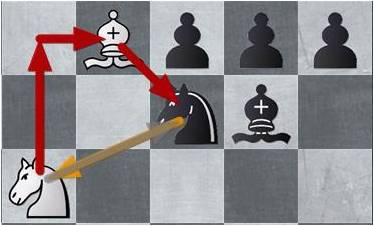Total Chess: Piece Strategy
Piece strategy means making your pieces better. Better pieces lead to better moves, and better moves lead to a better game.
What is a better piece? A better piece is a piece that is well placed on the board, or a piece that works well with other pieces.
A better piece is usually an active piece, a piece that is attacking or doing something useful. A worse piece is a passive piece, a piece that is defending or not doing anything useful. You should always try to make your pieces better, and try to make the opponent’s pieces worse.
Most moves in a chess game are positional moves, not tactical moves. Tactical moves make threats and help you win material or get checkmate. Positional moves make your pieces better, which will lead to tactical moves later. In the opening, almost all of your moves are positional moves, to make your pieces better. When you develop your pieces, you put them on better squares. You make your pieces active so they can attack, not passive where they must defend. Throughout the game, you need to make positional moves to improve your pieces. Better pieces lead to better moves, and better moves lead to a better game.
There are three parts to piece strategy to make your pieces better. Each part is about a different group of pieces.
1) Pawns: Whenever you make a move, you should always watch the pawns and consider what will happen to the pawn structure. Try to make your pawns strong, and try to make the opponent’s pawns weak. If you have strong pawns, try to keep them. If you have weak pawns, try to make them strong. If the opponent has strong pawns, try to trade them away. If the opponent has weak pawns, make him keep them. You would not want to trade a strong pawn of yours for a weak pawn of the opponent’s. Weak pawns will come back to hurt you later in the game, and strong pawns will come back to help you, especially in the endgame.
2) Pieces:
1. Protect your pieces. Unprotected pieces are always a worry and can lead to problems. They become targets for the opponent’s tactics and attacks. They may even cause problems for your own tactics. An unprotected piece may give the opponent a chance to break-out of your tactics. Sooner or later, unprotected pieces will cause you trouble. Whenever you can, protect your pieces, even if they are not yet being attacked. Then you do not have to worry about them later.
2. Improve your pieces. Whenever you can, you should try to make your pieces better. This means you should put them on better squares, where they will do more good. Better squares are usually in the center, or in the opponent’s territory, or near the opponent’s king. You should also try to make your pieces work together. Pieces that work together are better able to attack and defend when needed. Always try to improve your pieces.
3. Activate your pieces. Active pieces are pieces that are attacking or doing something good and useful. Passive pieces are pieces that are defending or that are not doing anything good or useful. Try to make your pieces active and try to make the opponent’s pieces passive. You would not want to trade an active piece of yours for a passive piece of the opponent’s, even if they are worth the same point value. Active pieces are worth more than passive pieces.
3) King: Keep your king safe. In the opening, the best way to keep your king safe is to castle. In the midgame and in the endgame, keep some pawns and pieces near your king. If the opponent has more pieces or better control of the area around your king, you must be careful. He may launch a checkmate attack against you. If he can trade away the pieces and pawns protecting your king, or force them to move away, or make a sacrifice to expose your king, then you could be checkmated. Watch the area around your king. Keep your king safe.
Likewise, you should try to make the opponent’s king and the area around it less safe. If you can break up the pawns protecting the opponent’s king, or force the pieces around it to move or to be traded away, then his king will become exposed to attack. Or, you may be able to invade the area around the opponent’s king with your pawns and pieces. Then you can launch a checkmate attack and maybe get checkmate.
***
From the book, “TOTAL CHESS: Learn, Teach and Play the Easy 1-2-3 Way,” by John Herron
TOTAL CHESS is your complete guide to chess. It covers everything: rules, strategies, tactics and checkmates.
Everything in chess comes in threes. Three simple strategies are presented for the opening, midgame, endgame, etc. Each lesson is brief and covers one concept in simple language that everyone can read and understand.











Comments: